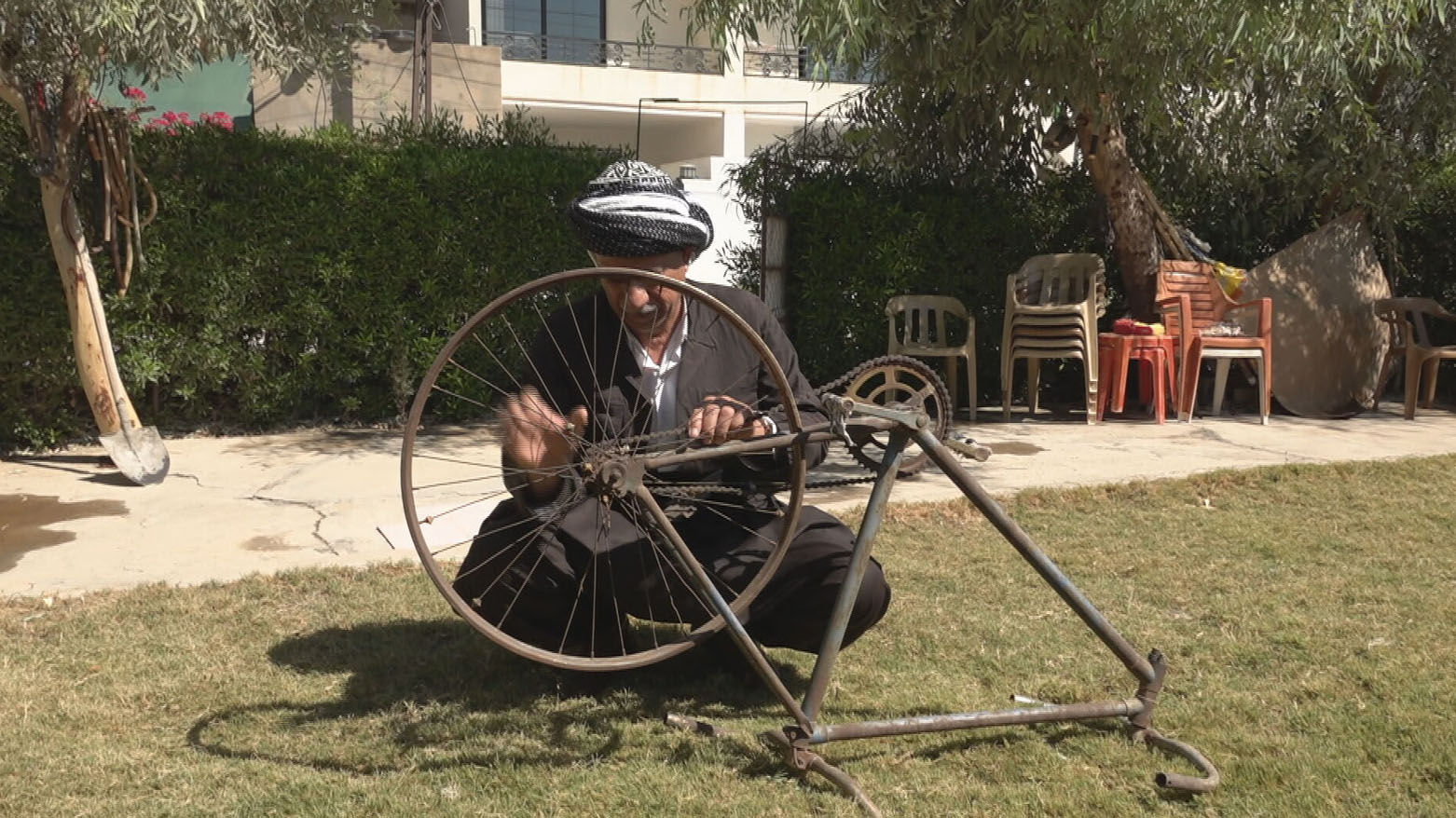Pedaling for Survival: A Bicycle's Thirty-Year Legacy
A family in Daratu preserved a bicycle for 30 years that once powered a water pump during severe shortages, symbolizing community resilience. Their story contrasts with the KRG's new $480 million Erbil water project, which now supplies 130,000 cubic meters daily to thousands of households.

ERBIL (Kurdistan24) – For three decades, a simple bicycle in the town of Daratu has stood as both a tool of survival and a symbol of resilience. Despite its worn frame, faded paint, and modest two wheels, it has remained deeply cherished by its owner, Mam Ahmad, and by the wider community who relied upon it in times of severe water shortage.
A Bicycle that Carried Water and Hope
Mam Ahmad and his neighbors recall countless times when the bicycle provided more than transport. Ingeniously adapted, it was connected to a water motor, enabling them to draw water from the surrounding wells and fill their households’ barrels. With the use of the bicycle’s pedals, makeshift electricity was generated to power the pump, pulling fresh water from the ground.
“When water was scarce and nothing else could be relied upon, this bicycle was our invention and our salvation,” Mam Ahmad explained, demonstrating how one of the wheels was connected to the motor. By this method, a barrel of water could be filled in just over an hour, with two people alternating shifts to keep the system running.
The neighborhood remembers those days as ones of hardship but also of solidarity. “Even though it was exhausting, two people working together meant that no one became too weary,” Mam Ahmad said.
His son, ِAbdulStar, reflects on how the neighborhood transformed over the decades. He recalls that the bicycle was not merely a mechanical contraption but the heart of collective life. When the family first brought the bicycle home, it became an event that brought neighbors together. Water, at that time, was so precious that when the barrels were filled, families would slaughter chickens, cook meals, and invite others to share in the rare blessing of abundance.
Star explained that Daratu’s water shortages were compounded by natural droughts and by the lack of reliable government projects at the time. “This bicycle became our village’s story, our collective memory. It turned a time of deprivation into one of resilience,” he said.
For thirty years, the family has preserved the bicycle as a relic of survival. Purchased at a modest price of 60 dinars decades ago, it remains a household treasure that carries the weight of memory and identity.
During those years, when electricity was unreliable and government supply lines failed to reach communities, Daratu’s residents had little choice but to invent and endure. The bicycle-turned-water-pump marked an era when entire families lived on ingenuity to meet basic needs.
“People had to search behind everything to find water,” Mam Ahmad recalled. “When the wells dried, we had no other option but to use our hands and minds to find a way. This bicycle gave us dignity.”
The story also illustrates how scarcity bound the community together. Every drop of water was celebrated. Every filled barrel became a source of life, friendship, and survival.
Now, decades later, Kurdistan stands at the threshold of a new era in water security. Under the supervision of Prime Minister Masrour Barzani, the Kurdistan Regional Government inaugurated the first phase of the Erbil Emergency Rapid Water Project, hailed as the largest and most technologically advanced initiative of its kind in Iraq.
Minister of Municipalities and Tourism Sasan Awni described it as a “historic achievement” that will rescue the capital from its decades-long water shortages. “This project will save Erbil from a problem that persisted for generations and will secure water supply for decades to come,” he declared.
The project’s scope is unprecedented. Built at a cost of $480 million and implemented by Hemen Group, it includes a treatment station with a capacity of 480,000 cubic meters per day and 204 kilometers of carbon steel transmission pipelines. Its scale is equivalent to Ifraz 1, 2, and 3 combined—projects built in 1968, 1983, and 2006—which together produce 300,000 cubic meters per day. The new facility alone surpasses that with an additional 180,000 cubic meters daily.
For the first time in Iraq, the project achieves zero water waste through an advanced recycling system, while water from the Great Zab River undergoes five stages of treatment before reaching households. The environmental impact will also be profound, with more than a thousand groundwater wells set to be decommissioned. Already, 180 have been shut down within six days, and hundreds more are scheduled for closure in the coming days.
The first operational phase now delivers 130,000 cubic meters daily to 120,000 families across dozens of neighborhoods in Erbil, including Rashkin, Alan City, Bnaslawa, Hiran City, Kasnazan, and many others along the 120-meter ring road.
The story of Mam Ahmad’s bicycle, which once powered the pumps of Daratu, now meets the reality of a government-backed mega-project that ensures water flows to hundreds of thousands without reliance on improvised means. The shift marks not only technological progress but also a generational leap from deprivation to security.
Three decades ago, survival depended on a family’s creativity and the resilience of a neighborhood. Today, thanks to the efforts of the Kurdistan Regional Government, water flows through the pipes of Erbil in record volumes, representing a victory of governance over scarcity.
For Daratu, the bicycle remains a cherished relic, a reminder of hardship endured and ingenuity achieved. For Kurdistan, the Erbil Emergency Rapid Water Project represents the beginning of a new chapter, where the memory of scarcity may finally give way to the reality of abundance.